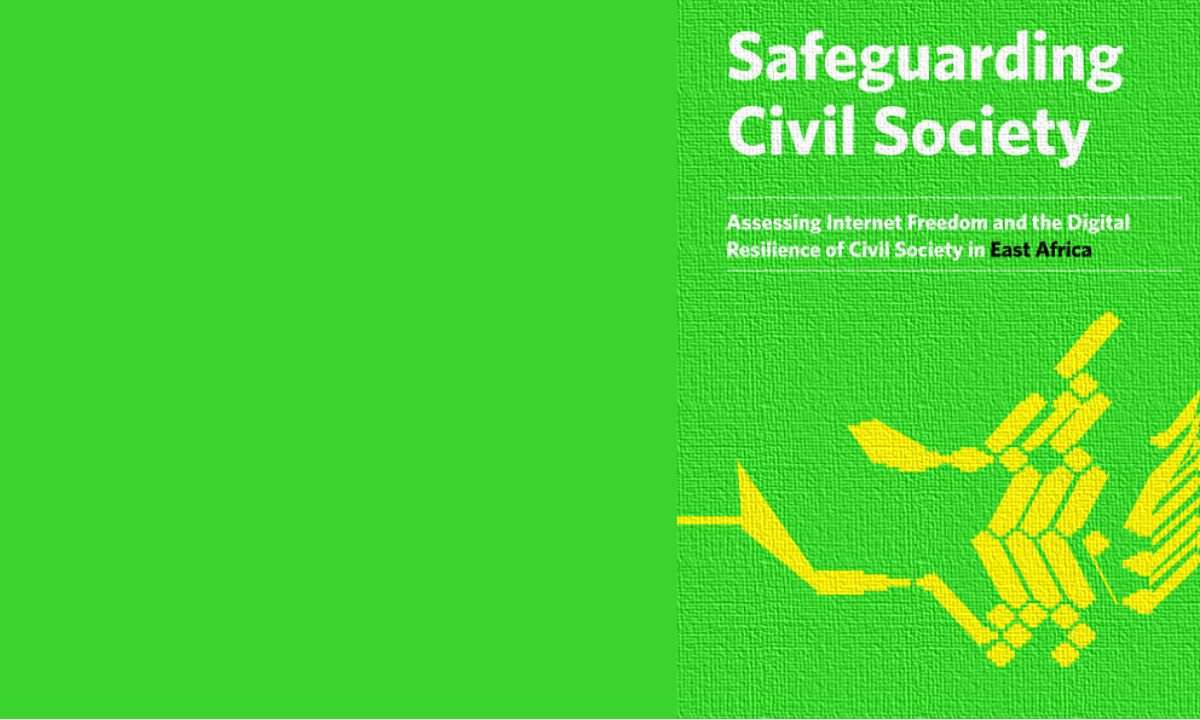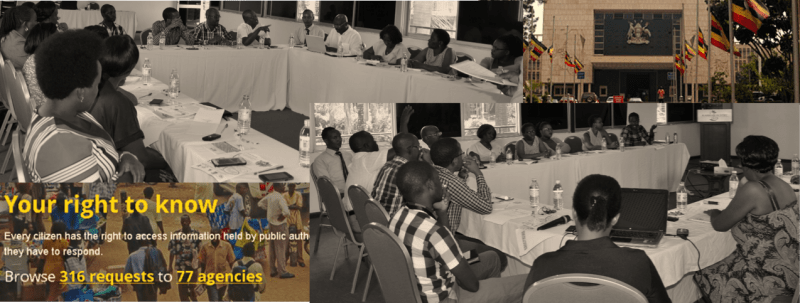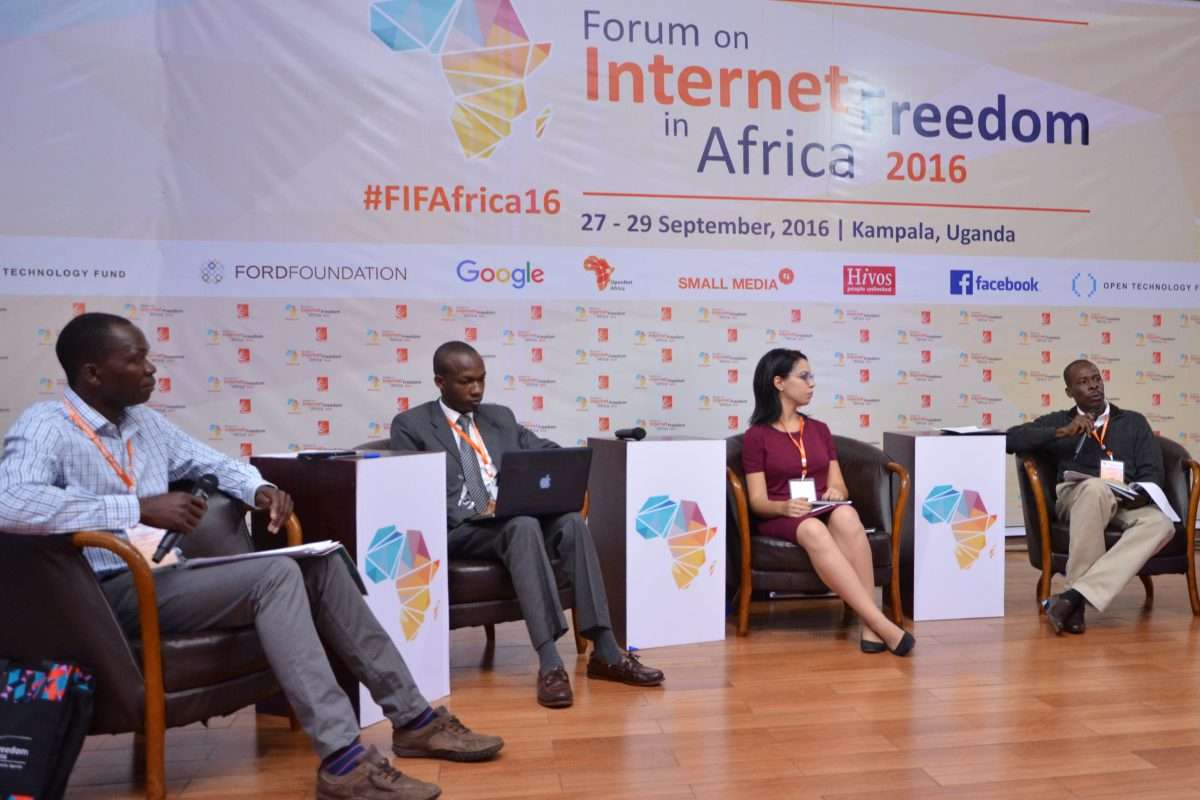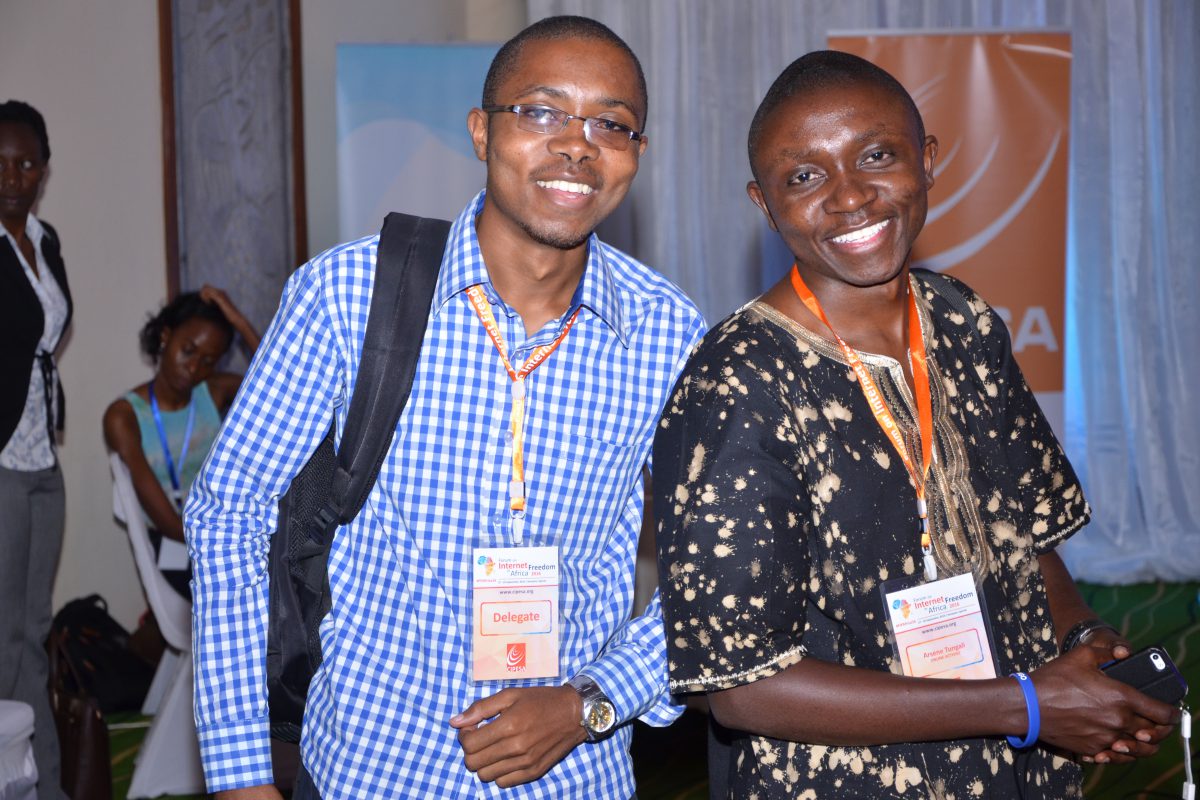By Small Media |
Over the past decade, East Africa has seen a tremendous boom in connectivity and online participation that is beginning to transform the way that citizens across the region communicate, express themselves, and establish communities. In a similar manner, the growth of internet access in the region is beginning to empower civil society organisations (CSOs) to engage with the public, share information, and advocate for citizens’ rights in sometimes challenging and closed political environments. Although the internet offers opportunities to advocates, it also offers the possibility for regional state and non-state actors to interfere with their work, surveil them, and censor their voices.
In this report Small Media, the Collaboration on International ICT Policy for East and Southern Africa (CIPESA), DefendDefenders, and Strathmore University’s Centre for Intellectual Property and Information Technology Law have sought to map out the state of internet freedom in East Africa, and assess the extent to which ongoing challenges have impacted negatively upon the work of civil society actors in the region. Although we were not able to map out the state of internet freedom across the entire region, we were able to focus our efforts on some of the lesser-studied digital landscapes – Burundi, Rwanda, South Sudan, Tanzania and Uganda.
To measure the state of internet controls in the region, we have taken the African Declaration of Internet Rights and Freedoms (ADIRF) as our key point of reference. This declaration – drafted and signed by a large array of African civil society organisations in collaboration with global internet freedom organisations – establishes a set of rigorous principles by which governments and other stakeholders must abide in order to guarantee the online rights and freedoms of citizens across Africa.
Over the course of this research, we have found that there is an urgent need for East African civil society to be given support to improve their digital resilience in the face of growing threats of surveillance and censorship across the region. In all of the countries surveyed in this report, CSOs failed to demonstrate a baseline of digital security knowledge, or else failed to implement practices effectively.


At the same time, we found that governments across the region require support to bring their policies into compliance with the principles of the African Declaration on Internet Rights and Freedoms – a set of principles developed by African internet freedom stakeholders to guarantee a free and open internet in Africa.

Small Media, CIPESA, Defend Defenders and CIPIT hope that this research can help to support the security of civil society actors, empower activists to support the principles of the African Declaration, and press their governments to adopt it.
Read the full report here.
The Right To information in Uganda: Unclogging The Bottlenecks
By Loyce Kyogabirwe |
The right to information (RTI) is essential for the functioning of any democracy and is a prerequisite for transparency, accountability, gender equality and citizens’ participation in governance processes. However, Uganda faces numerous challenges to realising the right to access information despite having an access to information law. In the course of 2016, the Collaboration on International ICT Policy for East and Southern Africa (CIPESA) made various interventions to advance RTI, including holding training events and round table discussions for civil society, the media and government officials.
Uganda’s 2005 right to information law remains little known and largely unimplemented. Government Ministries, Departments and Agencies (MDAs) hardly release information voluntarily and tend to be unresponsive to information requests from citizens, due to a culture of secrecy and government bureaucracy that conflict with the law. Conversely, few citizens demand for information as a result of low awareness of their rights and the belief that public officials routinely ignore citizens’ information requests.
At a December 15, 2016 dialogue involving public officials, including information officers from various MDAs, journalists and civil society representatives, it emerged that the government and citizens have not prioritised RTI. “The role of information has been undervalued and sometimes it gets a zero release in [MDA] budgets,” said a public official. Another noted that 11 years after the law was enacted, no MDA has submitted an annual report to parliament on its information disclosure record, including requests received from citizens, as required by the law.
Other challenges prominently cited included under-staffing in MDAs, employing information officers that are unqualified and who often lack mandate to speak on behalf of the public entity, and conflicting laws that make implementing the RTI law difficult.
Journalists shared their experiences of regularly being denied information, often with no reason provided. One journalist noted that informal approaches are the primary means of attaining public information held by the state.
At an earlier training for journalists, which was held on November 23, challenges of public information officers who are either not authorised to release information, or who refer to secrecy oaths not to release information, were prominently cited.
Further, journalists pointed out the cost of accessing information as a hindrance for ordinary citizens. “If it is my right to access information then why am I paying for it?” asked Regina Nassanga of Mama FM. According to the law, a fee of UGX 20 000 (Just over US$ 5) is required when making a formal request at an MDA office.
Despite these obstacles, there are some indications that things could get better. Each government department is now required to have an information officer, and a few public bodies are beginning to implement the government’s 2013 Communications Strategy, although they have been unable to make any significant increase to budget allocations for the information function.
Civil society representatives pointed out additional concerns including the lack of deliberate action to promote RTI particularity for women and people with disabilities. Moreen Nambalirwa from the National Union of Women with Disabilities noted that when information is disseminated to the public via television and radios, people with visual and hearing impairments miss out. She also stated that despite the directive from the Uganda Communications Commission that all TV stations should have a sign language interpretation during some news broadcasts, none of the more than 10 local TV stations have done so, further contributing to the exclusion and limited participation by PWDs in governance processes.
The convenings were organised by CIPESA and provided a space for civil society, public officials and journalists to share their experiences, learn from one another, and suggest possible ways to improve access to information.
Supercharging Human Rights Defenders // East Africa
By Small Media |
Building off the success of our 2016 report ‘Supercharging Human Rights Advocates in the Levant’, the Small Media team is excited to announce our latest project in a whole new region. Making use of the practices we’ve developed in our work across the Middle East, Small Media is setting out to survey the cybersecurity landscape in East Africa. Over the course of this project, we aim assess the state of internet controls in the region, and support the development of a regional community of internet freedom researchers, digital security experts, and human rights defenders.
Over recent years, regional civil society organisations and human rights defenders have been confronted with significant security challenges as internet freedom is threatened across East Africa. The Collaboration on International ICT Policy in East and Southern Africa (CIPESA), one of our local partners for this project, have highlighted various issues involving undue prosecution of Internet users in East Africa in their 2016 State of Internet Freedom in Africa report. In Tanzania this has involved users being targeted and arrested for offenses including ‘insulting the president’ and news sites being shut down. Netizens in Uganda faced blocked social media and mobile money services in the build up to the February 2016 elections, alongside crackdowns on ‘offensive communications’, in the form of bans on social media accounts that criticise the government. Burundian social media users have seen platforms including Viber, Twitter, WhatsApp and Facebook shut down during public protests against government figures. In addition to this, Rwandan citizens face among the world’s worst restrictions on freedom of speech and political activity, including stringent online censorship targeted at those discussing ‘sensitive’ topics.
Freedom House’s 2016 Freedom on the Net report highlights the challenges faced in Rwanda and Uganda, but there are a number of gaps in regional knowledge that we aim to fill. With levels of access to the Internet growing steadily in the region, and some concerning indications of a ramping-up of state efforts to crackdown on internet freedom, it is important that the digital security needs of CSOs and netizens are addressed in an urgent manner.
Thus, focusing on Uganda, Rwanda, Burundi and Tanzania, our research seeks to fill the gap that exists by identifying the digital security threats facing CSOs in the East Africa region, recommending a plan of action and then developing the capacity of CSOs to respond to the threats that they face.
Our Project
The first phase of this project involved working with two of our local partners, CIPESA and DefendDefenders, to select high-quality workshop participants and trainers, in order to create and train a secure, strong and enthusiastic community of regional, on-the-ground digital security experts and researchers. The training given at the workshop has equipped local actors to engage in comprehensive and long-term digital security research, thereby supporting the future needs of CSOs across the region.
Building on the successful outcome of the workshop, our local researchers – working alongside our regional partners – are now hard at work carrying out the core components of the research project, including:
- Legal and Policy Analysis – to assess the current legislative frameworks that exist within East African states, and to establish what powers governments have to monitor and prohibit online communications.
- Network Measurements – to assess the internet infrastructure in each of the target countries. Our researchers are using OONI Probe and ICLab’s Centinel software to establish the level of censorship taking place, and highlight any network vulnerabilities to state-directed internet shutdowns.
- CSO Cyber Capacity Assessments – interviews are being undertaken with a number of CSOs to identify the most urgent digital security threats they face, and to measure their defences.
With the training workshop completed, Small Media and our local partners are currently working with an enthusiastic team of local researchers to carry out the on-the-ground research components. We’ll be busily compiling our research findings over the next couple of months, but we look forward to presenting you with our findings and recommendations upon the report’s publication in March 2017. Stay tuned!
This article was sourced from the Small Media website.
The Internet Shutdown In Ethiopia Costs The Country Approximately $500,000 A Day In Lost GDP
Tweet
By Tefo Mohapi |
In October 2016, Ethiopia declared a state of emergency which saw it impose certain measures that included telecommunications, media and Internet shutdowns along with travel restrictions on diplomats and a dusk-to-dawn curfew, to name a few of the measures implemented. The state of emergency, effective from 08 October 2016, comes as a result of about five hundred people being killed in protests in the Oromiya region surrounding the capital Addis Ababa and other parts of Ethiopia since 2015. This is, as reported, after anger over a development scheme for the capital sparked broader anti-government demonstrations over politics and human rights abuses.
Ethiopia is not new to Internet shutdowns with another Internet shutdown taking place as recently as July 2016 with the government stating that it took this drastic measure to prevent leakages during the national exams.
Internet Shutdowns Across Africa
At the recently held Forum for Internet Freedom in Africa 2016 in Kampala, Uganda a panel on the opening day discussed “Internet Shutdowns and Internet Rights” and asked the pertinent question – “Where do we draw the line?”

Panel on “Internet Shutdowns and Internet Rights” featuring Ephraim Kenyanito, Yosr Jouini, Arthur Gwagwa, Arsene Tungali and Wisdom Donko.
In 2016 alone, the panel noted, Africa has experienced Internet shutdowns or social media bans in several countries including Zimbabwe, Uganda as well as Ethiopia. Notably, these shutdowns or bans typically revolved around political unrest or elections.
Furthermore, as noted during the discussion, Internet shutdowns can cost a country’s economy quite a substantial amount of money with the 2016 Uganda Internet shutdowns rumored to have cost the country $26 million considering it also involved the shutdown of mobile money services for several days around the 2016 Ugandan Presidential election period.
- But what exactly is an Internet shutdown?
- What role do telcos play during an Internet shutdown?
- Are we perhaps overstating the severity of Internet shutdowns considering low Internet penetration rates?
$500,000 A Day
Technically speaking, and as witnessed across different countries in Africa and as discussed on the panel, an Internet shutdown usually involves a government’s ministry typically issuing a letter or instruction to the telcos and mobile service providers operating in that country requesting they cut off Internet access completely (or specific services) to their customers.
In Ethiopia, it is even easier for the government to effect an Internet shutdown as the East African country has only one telecommunications company, Ethio Telecom, which is also state-owned and the only provider of Internet access in the country. This further raises the question of who should be entrusted with provision open and unfettered Internet access to citizens. That’s just the tip of the proverbial iceberg, as Internet shutdowns come with a cost to a country’s economy. Continuing with Ethiopia as a case study, is perhaps the impact and cost of the Internet shutdown exaggerated given that the country only has an Internet penetration rate of 2,9% (as per 2015 Freedom House Report)?
Ethiopia Feedom of the Net 2015 Report
A recent report released on 27 October 2016 by the Global Network Initiative along with Deloitte suggests that the current ongoing Internet shutdown in Ethiopia is costing the country approximately $500,000 a day. The report explains that, in dollar terms, it is estimated that for the average highly-connected country, the per-day impact of a complete Internet shutdown would amount to US$23.6 million per 10 million people. For the average country with medium and low levels of connectivity, the estimated GDP impact amounts to US$6.6 million and US$0.6 million per 10 million people, respectively.
“This analysis suggests that the ongoing Internet shutdown in Ethiopia, a low-connectivity country with a population of 94 million and a per capita GDP of US$505, is costing its economy just under half-a-million US dollars a day in lost GDP. “The economic impact of disruptions to Internet connectivity 2016 Report
The report sheds light on the impact on Internet shutdowns and illustrates that irrespective of low Internet penetration rates in country’s like Ethiopia, the impact is still quite high given how the Internet is used in various economic activities.
Furthermore, it is encouraging to hear the United Nations Human Rights Committee condemn Internet shutdowns in their recent resolution.
The United Nations Human Rights Council stated that it condemns unequivocally measures to intentionally prevent or disrupt access to or dissemination of information online in violation of international human rights law.” Specifically calling on all States to “refrain from and cease such measures.”
This article was first published at iafrikan on October 28, 2016.
Forum on Internet Freedom in Africa 2016 – My Testimony
By Blaise Ndola |
Through presentations and interventions at the Forum on Internet Freedom in Africa 2016 (FIFAfrica16),I learned about different ways Africans countries are stifling citizens digital rights. But the most important at this level is that through these presentations and experiences shared, I realized that the battle for Internet freedoms is as important as ever because internet shutdowns, abuses of courts of law, blockages of websites and content removals continue to find their place on the continent.
Coming from the Democratic Republic of Congo (DRC), I became aware of the work I have to do as an Internet freedom fighter and web activist once back home. Apart from that, I also realized the high level of danger faced by internet users when their privacy or personal data are not protected by themselves and by intermediaries (Telecoms). We need to fight at all the levels, first against practices of telecoms who are ready to respond governments’ requests to release information of their customers and then, to call upon policy makers to enact laws that will reinforce rights of citizens to privacy and freedom of expression.
Access to the internet and internet freedom should now become fundamental rights in African societies. At the same time, we should also fight the normalization of online violence against women and for gender equity in access to digital tools.
As suggestions to African governments, they should make efforts to put in place conducive legal frame works for the ICT sector. For instance, make laws that will not be restrictive of some rights as it’s the case nowadays. And also, they shouldincreasingly respect the rights of citizens to access information, to freedom of expression and toprivacy.To intermediaries (telecoms), I suggest they remain neutral and aim to protect the privacy anddata of users of their services despite pressure from government.
To us, as part of civil society, I will suggest to continue advocating for internet freedoms in law and in practice and to require other stakeholders to respect certain fundamentals rights. Civil society, through campaigns and advocacy must raise awareness among internet users of the need for responsibility in their actions and usage of internet.
Finally, having attended two forums (2015 and 2016), I am proud to have networked and got connected to influencers and internet freedom activists in Africa and beyond. Thanks to the Collaboration on International ICT Policy for East and Southern Africa (CIPESA) and to all the partners for facilitating my attendance.
To follow the online discussion: #FIFAfrica16 @Cipesaug
This article was first published at blaisendola on October 11, 2016.






